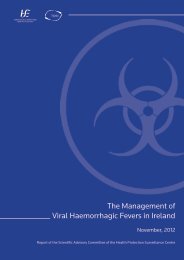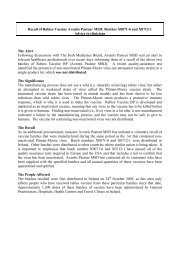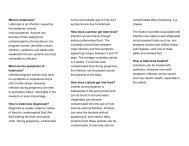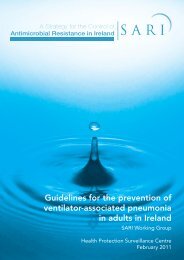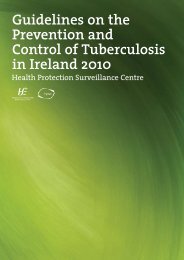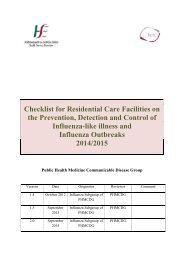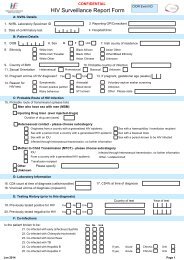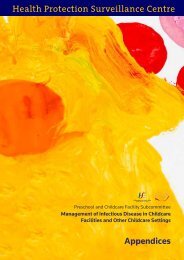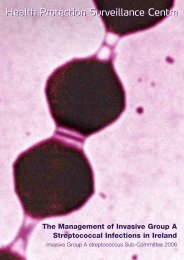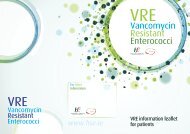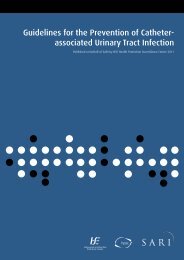Guidelines for the Early Clinical and Public Health Management of ...
Guidelines for the Early Clinical and Public Health Management of ...
Guidelines for the Early Clinical and Public Health Management of ...
Create successful ePaper yourself
Turn your PDF publications into a flip-book with our unique Google optimized e-Paper software.
<strong>Guidelines</strong> <strong>for</strong> <strong>the</strong> <strong>Early</strong> <strong>Clinical</strong> <strong>and</strong> <strong>Public</strong> <strong>Health</strong> <strong>Management</strong> <strong>of</strong> Bacterial Meningitis (including Meningococcal Disease)<br />
12.3 Investigation<br />
The following in<strong>for</strong>mation should be collected when investigating suspect or confirmed clusters:<br />
• Core <strong>and</strong> enhanced notification data (see enhanced <strong>for</strong>m) including<br />
o Risk factors<br />
o Vaccination detail<br />
o Complications<br />
o Microbiological data<br />
o Cluster investigation in<strong>for</strong>mation including (see Appendix 3)<br />
o Setting <strong>and</strong> population at risk<br />
• Type <strong>of</strong> setting (children’s day-care centre, school, residential, ward etc.)<br />
• Number <strong>of</strong> persons in setting with basic epidemiological description (age, employment,<br />
vaccination status, duration in setting)<br />
• Identification <strong>of</strong> any highly exposed sub-group e.g. school class<br />
• Close contacts.<br />
Preliminary investigation is required to determine if immediate public health action or fur<strong>the</strong>r investigation is<br />
required.<br />
Suspect cluster<br />
All suspect clusters should be investigated to confirm or refute <strong>the</strong> diagnosis.<br />
Confirmed cluster<br />
A confirmed cluster requires immediate public health action.<br />
12.4 Laboratory investigation <strong>of</strong> cases (<strong>and</strong> clusters)<br />
Pneumococcal disease should be confirmed <strong>and</strong> serotype in<strong>for</strong>mation sought as soon as possible. <strong>Early</strong> liaison<br />
between <strong>the</strong> consultant microbiologist, <strong>the</strong> Department <strong>of</strong> <strong>Public</strong> <strong>Health</strong>, HPSC <strong>and</strong> National Pneumococcal Typing<br />
Project is recommended.<br />
Additional tests may guide case management or cluster investigation<br />
The following tests are not confirmatory <strong>of</strong> invasive pneumococcal disease but can support <strong>the</strong> investigation <strong>and</strong><br />
management <strong>of</strong> suspect cases:<br />
• Sputum - culture<br />
• Nasopharyngeal swabs – culture.<br />
Non culture diagnostic tests<br />
• Urinary antigen tests.<br />
Urinary antigen tests have been used to assist in <strong>the</strong> clinical diagnosis <strong>of</strong> invasive pneumococcal disease. However,<br />
<strong>the</strong> clinical utility <strong>of</strong> <strong>the</strong> test is reduced in younger children as <strong>the</strong> positive predictive value is lower. A positive test<br />
may reflect carriage ra<strong>the</strong>r than disease. There<strong>for</strong>e, a case with S. pneumoniae antigen detected in urine but with no<br />
positive culture is considered to meet <strong>the</strong> criteria <strong>for</strong> ‘possible’ ra<strong>the</strong>r than ‘confirmed’ cases (see case definitions).<br />
Positive results, particularly in children < 2 years <strong>of</strong> age, must be interpreted with caution <strong>and</strong> in <strong>the</strong> context <strong>of</strong><br />
clinical observations <strong>and</strong> o<strong>the</strong>r investigations.<br />
PCR<br />
PCR- based assays <strong>for</strong> <strong>the</strong> detection <strong>of</strong> specific DNA sequences <strong>of</strong> S. pneumoniae are available <strong>and</strong> can be used on<br />
CSF, blood <strong>and</strong> fluids from normally sterile sites. Positive results in children < 2 years <strong>of</strong> age must be interpreted with<br />
caution <strong>and</strong> in <strong>the</strong> context <strong>of</strong> clinical observations <strong>and</strong> o<strong>the</strong>r investigations.<br />
Serotyping<br />
Rapid ascertainment <strong>of</strong> serotype is an important tool to confirm or exclude a suspected cluster, to assess <strong>the</strong><br />
relatedness <strong>of</strong> cases within a cluster <strong>and</strong> thus in<strong>for</strong>m public health management.<br />
Serotyping is undertaken by <strong>the</strong> National Pneumococcal Typing Project at <strong>the</strong> Department <strong>of</strong> <strong>Clinical</strong> Microbiology,<br />
RCSI Education <strong>and</strong> Research Centre, Beaumont Hospital, Dublin.<br />
All pneumococcal isolates should be sent to <strong>the</strong> National Pneumococcal Typing Project as soon as possible,<br />
particularly when investigating clusters <strong>of</strong> serious IPD. Upon suspicion <strong>of</strong> a cluster <strong>the</strong> microbiologist should liaise<br />
directly with <strong>the</strong> laboratory.<br />
-82-



